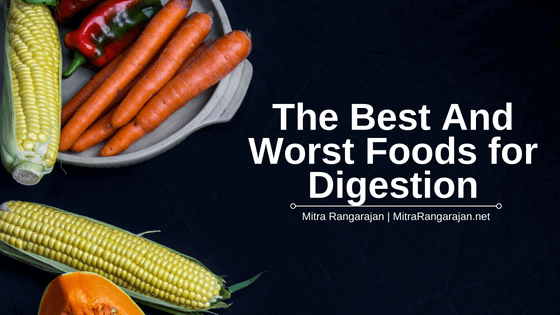Our stomachs do not react well to everything we eat, and there’s both good and bad when it comes to keeping our digestive system running smoothly. Certain foods are known for upsetting our digestive system while other foods can put our stomachs at ease. Here’s a quick guide to the best and worst foods for digestion.
It is also important to note that each individual may react differently to certain foods. For some, specific foods may upset their stomach more than others.
Worst Foods
Fatty Fried Food: It may come as no surprise that foods high in fat and fried are at the top of the worst food list. Both fatty and fried food can overwhelm the stomach, resulting in acid reflux and heartburn.
Alcohol: Since alcohol relaxes the body, it also relaxes the esophageal sphincter which can lead to acid reflux or heartburn. Alcohol also can irritate the stomach lining, impairing specific enzymes and preventing nutrients from being absorbed. Furthermore, too much alcohol can cause cramping and diarrhea. Worst of all, alcohol can damage your liver and pancreas,so think before you decide to binge drink this weekend.
Too Much Acidity: Foods high in acid, such as oranges, grapefruit, and lemons, should be consumed moderately. Eating these fruits on an empty stomach is a bad idea since it will cause heart burn and can cause acid reflux. Furthermore, absorbing acidity on an empty stomach irritates your stomach lining. There are some who argue that oranges, lime, lemon and grapefruit are alkaline foods and are good for you. They base this on “Potential Renal Acid Load.” I will discuss this controversy more in an upcoming blog. Stay tuned!
Processed Foods: Processed foods lack fiber, which can slow down your bowel movements. Overeating processed foods can act as a fertilizer for bad bacteria and yeast in your digestive system.
Best Foods
Yogurt: Many do not realize that you have trillions of bacteria in your gut, which help you digest food. Yogurt contains some types of these healthy bacteria that replenish the healthy flora within the GI tract. Try to eat plain yogurt and add fresh fruit to it as opposed to the sweetened fruits which have a lot of sugar.
Lean Meat and Fish: Another excellent food choice for your digestion system is lean meat and fish. If you are going to eat meat, choose fish, chicken or another lean meat over fatty red meats. Red meat typically takes longer to digest, which slows the energy release and requires time for the body to rest during digestion.
Bananas: Bananas help restore normal bowel function as well as restore electrolytes and potassium. This fruit is also a rich source of fructooligosaccharides, similar to yogurt and acts as a probiotic. This promotes the growth of good bacteria in the digestive tract.
Whole Grains: Our last best food for your digestive system is whole grains. Many of us lack fiber, which boosts good bacteria. Fiber also controls our hunger and helps prevent illness. As a matter of fact taking a heaping tablespoon of Psyllium husk mixed with apple juice will help restore the good bacteria, in addition to lowering your cholesterol, blood sugar and your weight. Opt for eating whole-wheat bread, oats, and brown rice.
Flax Seed: Flax seed is gluten free, low carbohydrate, rich in omega 3 fatty acids. It helps to lower cholesterol, blood sugar and promotes gut motility. The ground flax seed is easy to digest when compared to the whole seed. You can sprinkle roasted flax seed on your salad or soup. Like any food, this too must be consumed in small portions to gain the maximum benefit. Due to its’ high phytoestrogen property, it may provide selective benefit to some over others and likewise those who have blood disorders should be careful in consuming flax seed and so should pregnant women. Flaxseed is an excellent anti-oxidant and anti-inflammatory food which can make one’s blood pressure drop and so, those who suffer from hypotension should take precaution before consuming too much of flax seed.
Mitra Rangarajan is one of the few people in the world who is cross-trained and certified in three interrelated, interconnected and intertwined disciplines which are: Nutrition, Diabetes Management, and Clinical Medicine/GI. Read more of Mitra’s GI Nutrition articles here!

